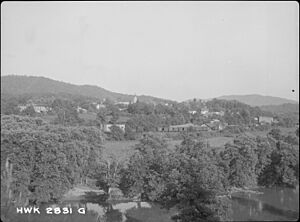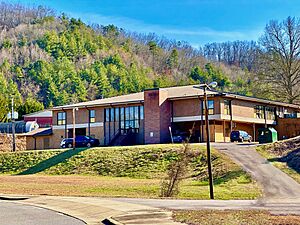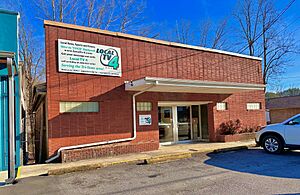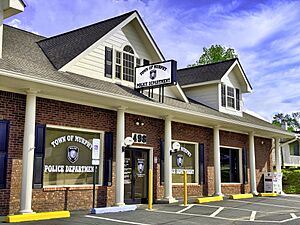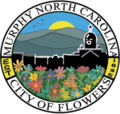Murphy, North Carolina facts for kids
Quick facts for kids
Murphy, North Carolina
|
||
|---|---|---|
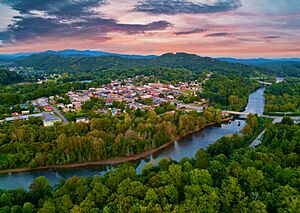
Murphy next to the Hiwassee River
|
||
|
||
| Nickname(s):
City of Flowers
|
||

Location of Murphy, North Carolina
|
||
| Country | United States | |
| State | North Carolina | |
| County | Cherokee | |
| Founded by | A. R. S. Hunter | |
| Named for | Archibald Murphey | |
| Area | ||
| • Total | 2.65 sq mi (6.85 km2) | |
| • Land | 2.54 sq mi (6.57 km2) | |
| • Water | 0.11 sq mi (0.28 km2) | |
| Elevation | 1,539 ft (469 m) | |
| Population
(2020)
|
||
| • Total | 1,608 | |
| • Density | 633.82/sq mi (244.70/km2) | |
| Time zone | UTC−5 (Eastern (EST)) | |
| • Summer (DST) | UTC−4 (EDT) | |
| ZIP code |
28906
|
|
| Area code(s) | 828 | |
| FIPS code | 37-45660 | |
| GNIS feature ID | 2406220 | |
Murphy is a town in North Carolina, United States. It is the main town of Cherokee County. Murphy is located where the Hiwassee and Valley rivers meet. It is the westernmost county seat in North Carolina. About 1,608 people lived in Murphy in 2020.
Contents
History of Murphy
Early Days and Name Change
Long ago, the Cherokee people lived in this area. They called this spot by the Hiwassee River Tlanusi-yi, which means "the Leech Place." They had a story about a giant leech named Tlanusi that lived in the river. An old path, later called the "Unicoi Turnpike", passed through here. It connected Cherokee lands east of the mountains with their towns in what is now Tennessee.
Later, European Americans started to settle here. They first named the place "Hunnington" or "Huntington". This was after A.R.S. Hunter, who set up the first trading post before 1828. He traded with the Cherokee and early settlers. He also started the first Post Office in June 1839.
The settlement was later renamed Murphy. It was named after Archibald Murphey, a politician from North Carolina. He was important for improving education in the state in the early 1800s. The town's name was supposed to be spelled "Murphey," but a mistake by a clerk made it "Murphy," and the new spelling stayed.
Fort Butler and the Trail of Tears
In 1836, the United States army built Fort Butler in what is now Murphy. This was during the Indian Removal period, also known as the Trail of Tears. Fort Butler was the main gathering place for Cherokee people living east of the mountains. From here, the Cherokee were forced to travel over the mountains on the Unicoi Turnpike. They were then taken to larger camps before being moved far away to what is now Oklahoma.
Today, the Unicoi Turnpike is called the Joe Brown Highway. You can visit the site where Fort Butler once stood. Historical markers tell the story of what happened there. The Cherokee County Historical Museum in Murphy also has information about the Trail of Tears.
The town of Murphy was officially surveyed in 1837. Cherokee County was formed in 1839. Murphy became the county seat (the main town for the county government) in 1851. Harshaw Chapel, built in 1869, is the oldest building still standing in Murphy.
Railroads and Growth
In 1888, the railroad reached Murphy. This connected the town to Marietta, Georgia. In 1891, the Southern Railway connected Murphy to Asheville. The old railroad line from Georgia was removed in the 1980s. The Great Smoky Mountains Railroad used to offer train rides to Murphy between 1988 and 1995. The tracks are still there, but trains no longer run on them. The old L&N Depot, built in 1901, is now a community center.
Murphy in the 20th Century
Murphy started getting paved streets in 1917. The first paved road to Georgia opened five years later. A highway connecting Murphy to Asheville opened in 1926.
The Cherokee County Courthouse in downtown Murphy was built in 1927. It was designed in a special style called Beaux-Arts. It is made with blue marble from the local area. This courthouse, along with Harshaw Chapel and the Robert Lafayette Cooper House, are listed on the National Register of Historic Places.
A two-story Carnegie Library was built in 1919. This building later housed the town's police department. Today, it is home to the Cherokee County Historical Museum. The Nantahala Regional Library, based in Murphy, is the oldest regional library in North Carolina. It opened in 1937 and serves Cherokee, Clay, and Graham counties. The current Murphy Public Library opened in 1976 and was updated in 2001.
Murphy was once home to Margaret Studios, a famous company that made crafts. They had stores all over the country selling woodcrafts and home items like lazy Susans.
Murphy High School was built in 1925. A new campus for the high school was built in 1957. Murphy got a public swimming pool in 1931. The pool closed in 1997, and a new one opened around 2006 as part of the Hiwassee Valley Pool & Wellness Center. This new pool was covered in 2022.
In 1933, a famous Christmas song called "I Wonder as I Wander" was inspired by a phrase heard in Murphy. Also, the song “Detour (There's a Muddy Road Ahead)" was written in 1945 while traveling to Murphy.
Murphy's first hospital was Petrie Hospital, started in 1933. Later, the Sisters of Providence of Holyoke took over and renamed it Providence Hospital. In 1979, Murphy Medical Center was founded nearby.
A new post office was built in Murphy in 1949. Around 1961, the Dr. William A. Hoover Bridge was built over the Hiwassee River. This bridge helps US Route 19 travelers. Levi Strauss & Co. opened a jeans factory in Murphy in 1963. It employed many people but closed in 1999. Now, Snap-on Tools uses the building.
Recent Events
On April 3, 1974, a strong tornado hit Murphy. It caused a lot of damage and sadly, four people died. It was part of a very large group of tornadoes that hit the area. Another tornado hit Murphy on March 2, 2012. It damaged schools and businesses.
About a year after the 2012 tornado, debris in the Valley River caused part of a bridge to collapse. This also damaged the water system, leaving many businesses without water or sewer.
A four-lane highway was built between Murphy and Andrews around 1977. Walmart opened its first North Carolina store in Murphy in 1983. The store moved to a new location in 1991. The old Walmart building is now other stores and restaurants.
In 2003, a person known as the Olympic Park bomber was caught in Murphy by a police officer. In October 2024, one of the oldest buildings in downtown Murphy, built during the Civil War, was taken down.
Population and People
| Historical population | |||
|---|---|---|---|
| Census | Pop. | %± | |
| 1870 | 175 | — | |
| 1880 | 170 | −2.9% | |
| 1890 | 803 | 372.4% | |
| 1900 | 604 | −24.8% | |
| 1910 | 977 | 61.8% | |
| 1920 | 1,314 | 34.5% | |
| 1930 | 1,612 | 22.7% | |
| 1940 | 1,873 | 16.2% | |
| 1950 | 2,433 | 29.9% | |
| 1960 | 2,235 | −8.1% | |
| 1970 | 2,082 | −6.8% | |
| 1980 | 2,070 | −0.6% | |
| 1990 | 1,575 | −23.9% | |
| 2000 | 1,568 | −0.4% | |
| 2010 | 1,627 | 3.8% | |
| 2020 | 1,608 | −1.2% | |
| U.S. Decennial Census | |||
Murphy's Population in 2020
| Group | Number | Percentage |
|---|---|---|
| White (not Hispanic) | 1,291 | 80.29% |
| Black or African American (not Hispanic) | 66 | 4.1% |
| Native American | 26 | 1.62% |
| Asian | 37 | 2.3% |
| Other/Mixed | 145 | 9.02% |
| Hispanic or Latino | 43 | 2.67% |
In 2020, there were 1,608 people living in Murphy. There were 774 households and 394 families.
Murphy's Population in 2010
In 2010, the total population of Murphy was 1,621 people.
Murphy's Economy
Jobs in Murphy, North Carolina Management & Professional (25%) Service (15.3%) Sales & Office (21.1%) Farm, Fishing & Forestry (1.9%) Construction, Extraction & Maintenance (17.4%) Production/Transportation (19.3%)
Murphy's economy has jobs in many different areas. About a quarter of the people work in management and professional jobs. About one-fifth work in sales/office jobs or in construction and maintenance. The smallest number of jobs are in farming, fishing, or forestry. The average income for a household in Murphy is $24,952.
Many companies offer jobs for skilled workers. These include Moog Components Group, Aegis Power Systems, Murphy Medical Group, and Sioux Tools. Tri-County Community College also provides jobs. Harrah's Cherokee Valley River, a casino that opened in Murphy in 2015, is also a big employer.
Murphy also has two places that "mine" Bitcoin, which is a type of digital money. These operations like Murphy because of its low electricity costs and open land.
Education in Murphy
The local public schools are run by Cherokee County Schools. There are 13 schools in the county:
- Murphy Elementary
- Peachtree Elementary
- Marble Elementary
- Martins Creek Elementary
- Ranger Elementary
- Murphy Middle
- Andrews Middle
- Hiwassee Dam Middle
- The Oaks Academy
- Andrews High
- Hiwassee Dam High
- Murphy High
- Tri-County Early College
One private school option is Murphy Adventist Christian School (for grades K-8). Many families also choose to teach their children at home.
For higher education, students can go to Tri-County Community College in Murphy. There are also several colleges and universities nearby:
- North Georgia Technical College
- Young Harris College
- Western Carolina University
- Southwestern Community College
- University of North Georgia
The John C. Campbell Folk School is located near Murphy. It is the oldest and largest folk school in the United States. This school teaches creative folk arts to people of all ages. It also hosts music concerts and community dances.
Getting Around Murphy
Murphy is located just northwest of major highways like 19, 74, 64, and 129. This makes it easy to reach by car.
You can get around town and the county using Cherokee County Transit for a small fee. There are also private taxis available.
The Western Carolina Regional Airport (also called Murphy Airport or Andrews-Murphy Airport) is located between Murphy and Andrews.
The closest big airports for commercial flights are:
- Chattanooga Metropolitan Airport (about 83 miles away)
- Hartsfield–Jackson Atlanta International Airport (about 126 miles away)
Murphy's Services and Utilities
Electricity and Gas
Duke Energy provides electricity to Western North Carolina. About half of its power comes from nuclear power plants. Some power also comes from solar panel farms near Murphy. There are at least four solar farms, each with more than 4,000 panels. One farm, Martins Creek Solar Project, makes enough electricity for over 150 homes.
The town of Murphy's electricity is provided by Murphy Electric Power Board.
Natural gas is supplied by Piedmont Gas.
News and Media
The Cherokee Scout is a weekly newspaper based in Murphy. It is the only newspaper in Cherokee County and started in 1889.
Three radio stations broadcast from Murphy:
- WKRK 1320 AM
- WCVP 600 AM
- WCNG 102.7 FM
Local TV 4 is a television news station based in Murphy.
Roads and Bridges
The Town of Murphy maintains 14.8 miles of roads. Other roads nearby are maintained by the North Carolina Department of Transportation. The town receives about $56,000 each year to help with street maintenance. There is a special historic bridge in downtown Murphy. It shows an early way of building bridges.
Healthcare
Erlanger Western Carolina Hospital serves Murphy and all of Cherokee County. It is approved by the United States Department of Health and Human Services. The hospital has 191 beds, including beds for nursing home care and for patients with Alzheimer's.
Police and Safety
The Murphy Police Department protects Murphy and the areas around it. In February 2024, the department moved to a new building. The new station is much larger than their old one, which was in the basement of the old Carnegie Library. The current chief of police is Tim Lominac.
The Cherokee County Sheriff's Office serves all of Cherokee County. Dustin D. Smith is the current Sheriff. The current Cherokee County Jail was built in 2008 and can hold about 150 people.
The Murphy Police Department's goal is to make life better and safer for everyone in Murphy. They work with the community to protect people and property. They do this by fairly enforcing laws, preventing crime, and solving problems together.
Geography and Climate
Location and Landscape
Murphy is located in the middle-east part of Cherokee County. It sits where the Hiwassee River and Valley River meet.
The town has a total area of about 6.8 square kilometers (2.6 square miles). Most of this is land, and a small part is water (about 0.6 square kilometers or 0.2 square miles).
Murphy is in southwestern North Carolina, about halfway between Atlanta, Georgia and Knoxville, Tennessee. The area has gentle rolling hills and mountains. Some peaks are over 5,000 feet high. Being in the Blue Ridge Mountains helps the area stay mostly rural. You can find wildlife like bear, deer, fox, and recently, reintroduced elk.
Weather in Murphy
Murphy has a humid subtropical climate. This means it has hot, humid summers and cool to mild winters. The low temperatures are cooler than in other parts of the Southeast because of the higher elevation. Like the rest of the southeastern U.S., Murphy gets a lot of rain, especially in winter. Some parts of Cherokee County get as much as 100 inches of rain per year and are called part of the Appalachian temperate rainforest.
Snowstorms are rare but can happen. In 1993, a big storm dropped 15 inches of snow in 24 hours, with some areas getting up to 38 inches. This caused power outages and other problems.
The average temperature in Murphy ranges from about 37.5°F (3.1°C) in January to 74.9°F (23.8°C) in July. Each year, there are about 20 days where the temperature reaches 90°F (32°C) or higher. There are about 106 days where the temperature drops below freezing. Only about 4 days a year stay at or below freezing all day. The coldest temperature ever recorded was -16°F (-27°C) in January 1985. The hottest was 100°F (38°C) in July 2012.
| Climate data for Murphy 4ESE, North Carolina (1991–2020 normals, extremes 1873–present) | |||||||||||||
|---|---|---|---|---|---|---|---|---|---|---|---|---|---|
| Month | Jan | Feb | Mar | Apr | May | Jun | Jul | Aug | Sep | Oct | Nov | Dec | Year |
| Record high °F (°C) | 76 (24) |
81 (27) |
88 (31) |
92 (33) |
91 (33) |
98 (37) |
100 (38) |
99 (37) |
96 (36) |
93 (34) |
84 (29) |
77 (25) |
100 (38) |
| Mean maximum °F (°C) | 67.1 (19.5) |
71.3 (21.8) |
77.9 (25.5) |
84.7 (29.3) |
87.0 (30.6) |
90.7 (32.6) |
92.5 (33.6) |
92.1 (33.4) |
89.5 (31.9) |
83.0 (28.3) |
76.5 (24.7) |
68.0 (20.0) |
93.8 (34.3) |
| Mean daily maximum °F (°C) | 49.8 (9.9) |
53.5 (11.9) |
61.6 (16.4) |
70.8 (21.6) |
77.5 (25.3) |
83.5 (28.6) |
86.6 (30.3) |
86.0 (30.0) |
81.3 (27.4) |
71.8 (22.1) |
61.4 (16.3) |
52.7 (11.5) |
69.7 (20.9) |
| Daily mean °F (°C) | 37.5 (3.1) |
40.8 (4.9) |
47.7 (8.7) |
56.0 (13.3) |
64.1 (17.8) |
71.3 (21.8) |
74.9 (23.8) |
74.2 (23.4) |
68.6 (20.3) |
57.5 (14.2) |
47.1 (8.4) |
40.5 (4.7) |
56.7 (13.7) |
| Mean daily minimum °F (°C) | 25.3 (−3.7) |
28.0 (−2.2) |
33.8 (1.0) |
41.2 (5.1) |
50.7 (10.4) |
59.2 (15.1) |
63.2 (17.3) |
62.3 (16.8) |
55.8 (13.2) |
43.3 (6.3) |
32.8 (0.4) |
28.4 (−2.0) |
43.7 (6.5) |
| Mean minimum °F (°C) | 8.4 (−13.1) |
13.4 (−10.3) |
18.9 (−7.3) |
27.2 (−2.7) |
36.2 (2.3) |
48.8 (9.3) |
56.2 (13.4) |
54.9 (12.7) |
43.3 (6.3) |
29.1 (−1.6) |
19.8 (−6.8) |
14.7 (−9.6) |
5.7 (−14.6) |
| Record low °F (°C) | −16 (−27) |
−4 (−20) |
−3 (−19) |
18 (−8) |
25 (−4) |
35 (2) |
46 (8) |
48 (9) |
28 (−2) |
21 (−6) |
6 (−14) |
−4 (−20) |
−16 (−27) |
| Average precipitation inches (mm) | 5.10 (130) |
5.26 (134) |
5.29 (134) |
5.20 (132) |
4.75 (121) |
5.41 (137) |
5.25 (133) |
4.70 (119) |
4.28 (109) |
3.45 (88) |
4.60 (117) |
5.99 (152) |
59.28 (1,506) |
| Average snowfall inches (cm) | 0.8 (2.0) |
1.5 (3.8) |
0.1 (0.25) |
0.0 (0.0) |
0.0 (0.0) |
0.0 (0.0) |
0.0 (0.0) |
0.0 (0.0) |
0.0 (0.0) |
0.0 (0.0) |
0.1 (0.25) |
1.9 (4.8) |
4.4 (11) |
| Average precipitation days (≥ 0.01 in) | 11.5 | 11.3 | 11.9 | 10.9 | 11.4 | 12.6 | 12.2 | 11.3 | 9.2 | 8.2 | 9.3 | 11.9 | 131.7 |
| Average snowy days (≥ 0.1 in) | 0.9 | 0.9 | 0.2 | 0.0 | 0.0 | 0.0 | 0.0 | 0.0 | 0.0 | 0.0 | 0.1 | 0.8 | 2.9 |
| Source: NOAA | |||||||||||||
Nearby Towns and Cities
Here are some towns and populated areas within about 15 miles of Murphy:
Famous People from Murphy
- Abraham Enloe (1762–1841) – Buried in Harshaw Chapel in downtown Murphy. Some believe he was the biological father of US President Abraham Lincoln.
- Preston Henn – Started the Fort Lauderdale Swap Shop and was a race car driver.
- Junaluska – A Cherokee hero from the 1800s, famous for his bravery in a battle. He was born in what is now Murphy.
- Carl Pickens – A great football player who was named NFL Offensive Rookie of the Year in 1992. He played for the Cincinnati Bengals and was an All-American wide receiver for the Tennessee Volunteers. He helped Murphy High School win state football championships in 1986 and 1987.
- Phil Voyles – A former MLB baseball player for the Boston Braves.
- Hedy West – A well-known folksinger and songwriter from the 1960s. She graduated from Murphy High School.
Images for kids
See also
 In Spanish: Murphy (Carolina del Norte) para niños
In Spanish: Murphy (Carolina del Norte) para niños



